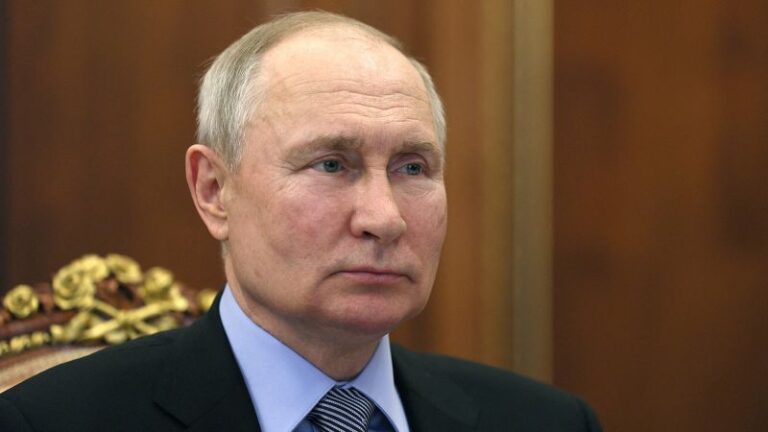CNN
—
Russian President Vladimir Putin has just survived his biggest ever challenge – but has largely remained out of the spotlight since then.
The long-time Russian leader has not addressed his country since delivering a somber speech on Saturday morning, at the height of an insurrection led by his former ally and owner of Wagner paramilitary group Yevgeny Prigozhin.
Prigozhin was also nowhere to be seen. The head of the private military group was last seen leaving the southern city of Rostov-on-Don late on Saturday, after abruptly calling off his troops’ march on Moscow.
Putin’s spokesperson Dmitry Peskov insisted on Saturday that the president was “working at the Kremlin,” but there’s been no clear information about his whereabouts since then.
A pre-recorded video of Putin addressing the “International Youth Industrial Forum” from behind a nondescript desk flanked by Russian flags was released by the Kremlin on Monday, but there was no information about when or where the clip was filmed. In the short video, Putin doesn’t make any mention of the events of the past weekend, focusing instead on the forum.
The Kremlin also released two statements saying Putin held phone calls on Monday with the Emir of Qatar, Sheikh Tamim bin Hamad Al Thani, and Iranian President Ebrahim Raisi. The statements didn’t specify Putin’s location. Iran and Qatar both separately confirmed the phone calls.
The press service of Prigozhin’s Concord management company said on Sunday the Wagner chief “sends his regards to everyone and will answer questions when he has proper communication.”
The Kremlin has claimed that Prigozhin agreed to leave Russia under a Minsk-brokered deal that would reportedly see him enter into exile in Belarus without facing criminal charges for the rebellion.
Prigozhin, however, has not acknowledged or commented on the reported deal. Announcing the decision to turn his forces around, Prigozhin simply said he did it to “avoid bloodshed.”
Russian state news agency TASS reported Monday that the investigation into the criminal case involving Prigozhin and his alleged involvement in organizing an armed mutiny was still active, citing a source close to the Prosecutor General’s Office.
The crisis was the culmination of Prigozhin’s very public and months-long feud with Russia’s military leadership.
He had previously accused Defense Minister Sergei Shoigu and Russia’s top general, Valery Gerasimov, of not giving his forces ammunition and was critical of their handling of the conflict, but he always defended the reasoning for the military campaign and steered clear of criticizing Putin himself.
But he crossed these red lines over the weekend. Late on Friday, Prigozhin accused Russia’s military leadership of killing his fighters during a strike on a Wagner camp, which the Russian Defense Ministry has denied.
Prigozhin demanded Gerasimov and Shoigu meet him in Rostov-on-Don, a key military base for Russia’s war in Ukraine. His forces then took control of military facilities in two Russian cities and began advancing towards Moscow on Saturday before turning back later in the day.
Russian Prime Minister Mikhail Mishustin acknowledged on Monday that the country faced a “challenge” to its internal stability.
“These days the country faced an obvious challenge, an attempt was made to destabilize the internal situation in Russia,” Mishustin said in a video meeting with cabinet members. Mishustin added that mebers of the Russian government were “at their workplaces” and commended them for their response to the threat.
“Under the leadership of the President, they acted clearly, in a coordinated manner, and maintained the stability of the situation at all levels in order to prevent the situation from worsening and protect citizens from all possible threats that might arise,” he said.
Meanwhile, the Russian Defense Ministry said on Monday that Shoigu visited Russian troops involved in the military operation in Ukraine, although neither the ministry nor state media said when the visit took place.
The impact of the insurrection on Russia’s war on Ukraine remains unclear – although Kyiv insisted the latest events point to Putin’s growing weakness.
Ukrainian President Volodymyr Zelensky said Saturday that Putin had his own actions to blame for the situation. “He knows what he is afraid of because he himself created this threat. All evil, all losses, all hatred – he himself who spreads it.”
Zelensky added that he had spoken with US President Joe Biden, Canadian Prime Minister Justin Trudeau and Polish President Andrzej Duda.
“We have exchanged our assessments of what is happening in Russia. We see the situation in the same way and know how to respond,” Zelensky said, adding: “Russian aggression is gradually returning to its home harbor.”
NATO Secretary-General Jens Stoltenberg said Monday that the events that unfolded in Russia over the weekend demonstrate that Putin made a “big strategic mistake” by launching a war on Ukraine. Meanwhile, US Secretary of State Antony Blinken said Sunday that the brief and chaotic insurrection showed “cracks” in Putin’s role as leader of the country.
“This is just an added chapter to a very, very bad book that Putin has written for Russia. But what’s so striking about it is, it’s internal,” Blinken told CNN’s Dana Bash on “State of the Union,” describing the situation as “extraordinary.”
The Ukrainian military said that fighting continued in the eastern Ukraine Donetsk region, along the front lines around Lyman, Mariinka and Bakhmut. It said the fighting was characterized by heavy exchanges of indirect fire but little movement. It also said Russian air attacks continued throughout the weekend and into Monday.
The Ukrainian Air Force said Monday it had intercepted 13 air attacks overnight.
However, the Ukrainians said they were on the front foot around Bakhmut, with the spokesperson for the Eastern Grouping of the Armed Forces, Serhii Cherevatyi, saying Ukrainian troops “hold the initiative, continue assault operations and push the enemy back.”



